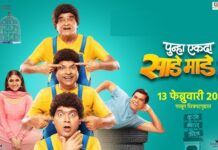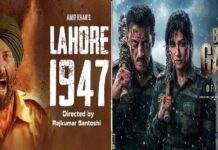| Eros International and Prakash Jha Productions’ Chakravyuh (UA) is the story of the ongoing war between Naxalites and the state. Adil Khan (Arjun Rampal) and his wife, Rhea Menon (Esha Gupta), are police officers. They meet their close college friend, Kabir (Abhay Deol), after many years, at a college reunion function. Soon, Adil is posted to Nandighat to combat Naxalites there. He realises that Nandighat is almost ruled by Naxalites and that it is impossible to overpower them because of lack of information about their moves. Kabir, a police dropout, volunteers to join the Naxalite gang undercover so that he can leak information to Adil to help him overpower the gang.
In the gang of Naxalites, the key persons are Govind Suryavanshi (Om Puri), Rajan (Manoj Bajpayee), Juhi (Anjali Patil) and Naga (Murali Sharma). Kabir, with some difficulty, manages to join them and gets on the job of spilling the beans about their moves, making it easy for Adil Khan to attack them. At the centre of the tension between the state and the Naxalites is a huge plot of land which industrialist Sahota (Kabir Bedi) wants to take over from the Adivasis for a pittance. The state, of course, is supporting Sahota but the Naxalites are fighting for the poor Adivasis. Soon, Kabir starts seeing the view point of the Naxalites and sympathising with them. On occasions, he even accuses Adil Khan and his men of perpetrating atrocities on the Naxalites. This, obviously, creates a rift between the two friends. Soon, Rhea is also transferred to Nandighat to head an intelligence cell of the police. What happens thereafter? Is Rhea able to make peace between husband Adil Khan and close friend Kabir? Does she take sides with one of them – is he Adil or Kabir? Do the Naxalites get to know of Kabir’s true identity? Whom does Kabir ultimately support? Does he have a change of heart again or does Adil Khan change his stand? Answers to these and other questions are revealed towards the end. Anjum Rajabali’s story is well-researched and establishes quite nicely the ongoing tension between the government and the Naxalities. However, so much emphasis is laid on realism that the drama turns out to be dull, dry and drab, devoid of entertainment. The screenplay, penned by Anjum Rajabali, Prakash Jha and Sagar Pandya, is replete with incidents of tension either between the state and the Naxalites or between Adil and Kabir, many of which are predictable. It assumes that the audience knows a great deal about the Naxalites and, therefore, does not get to the base of the war. For this reason, the audience is not able to decide with which side its sympathy should lie. The film also does not offer any solution and leaves the war open-ended, making it even more difficult for the viewers to get up with a feeling of satisfaction, after watching it. Kabir’s change of heart looks hurried, especially because he is not shown to be a novice but rather a thinking individual. The confrontation scenes between Adil Khan and Kabir are not half as intense and entertaining as they should’ve been – and this is a major drawback of the screenplay. Although there are many characters in the drama, it revolves mainly around two of them – Adil Khan and Kabir – leaving most of the others with roles which are hardly meaty. Dialogues (Prakash Jha and Anjum Rajabali), which ought to have been firebrand, lack the punch at many places. Arjun Rampal does a fairly good job but the role needed an actor with far more fire in him. He needs to work on his dialogue delivery as he often forgets to lay emphasis on the right word in a sentence. Also, his dialogue delivery is quite flat which does not go well with his character and with the drama. Abhay Deol is natural, as always, but he doesn’t get good enough scenes to do justice to his immense talent. Esha Gupta gets very limited scope and she is alright. Manoj Bajpayee hardly has a worthwhile role. He acts well. Anjali Patil is quite nice. Om Puri is hopelessly wasted. Murali Sharma is very natural. Kabir Bedi is quite effective. Kiran Karmarkar shines as the wily minister. Chetan Pandit does not evoke the desired hatred in the role of the evil police officer. Mukesh Tiwari and Dayashankar Pandey add nothing to the drama. Vinay Apte, S.M. Zaheer and Brijgopal do as required. Sameera Reddy adds oomph in a special appearance in a song-dance number. Others are okay. Prakash Jha’s direction is good but his over-emphasis on realism makes the narrative style very dry and boring. Music (by Salim-Sulaiman, Aadesh Shrivastava, Sandesh Shandilya, Shantanu Moitra and Vijay Verma) is fair. The ‘Mehengai’ song (composed by Vijay Verma) and the ‘Kunda khol’ number (set to tune by Sandesh Shandilya) have appeal for the masses. Lyrics, written by Irshad Kamil, Turaz, Panchhi Jalonvi and Ashish Sahu, are weighty. Ganesh Acharya’s choreography makes for pleasurable viewing of the ‘Kunda khol’ song. Sachin Krishn’s camerawork is very good. Abbas Ali Moghul’s action scenes are realistic. Art direction (Jayant Deshmukh and Mohd. Muniruzzama) is appropriate. Editing (Santosh Mandal) could’ve been sharper. On the whole, Chakravyuh is a dull, dry and drab drama which lacks in entertainment. It may be liked by lovers of realistic cinema but that simply won’t be enough for the film to score at the box-office. Losing. Released on 24-10-’12 (Wednesday) at Eros (daily 1 show), New Excelsior (daily 3 shows) and other cinemas of Bombay by Eros International. Publicity: good. Opening: dull in spite of Dassera holiday. …….Also released all over. Opening was quite weak at most of the places. A perceptible drop in collections was noticed on 25th (Thursday). |




























